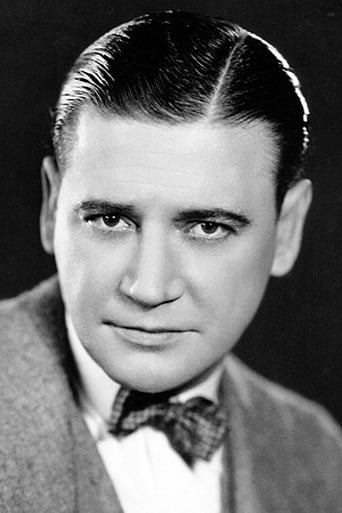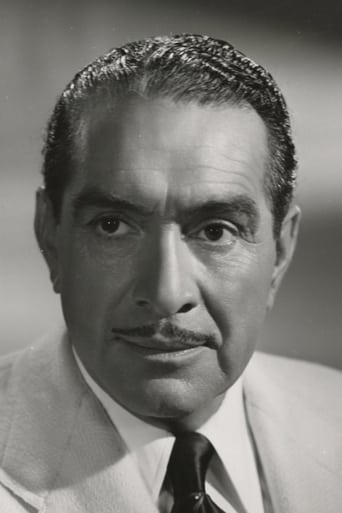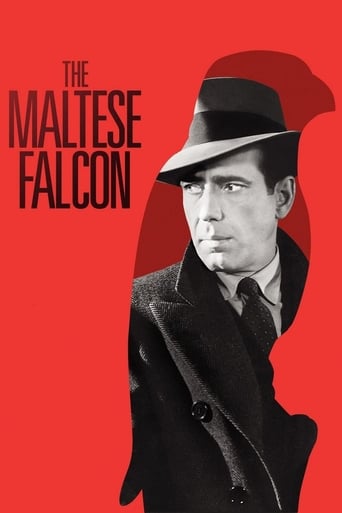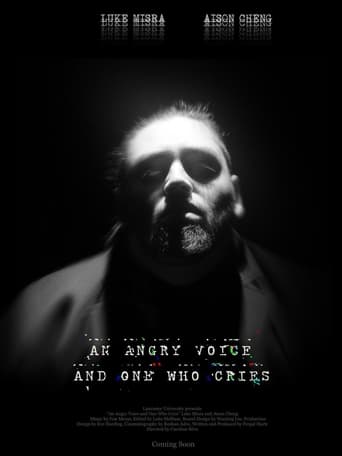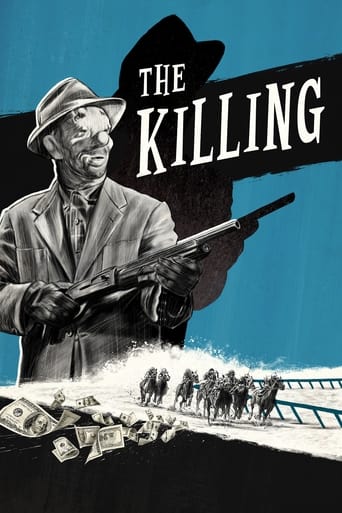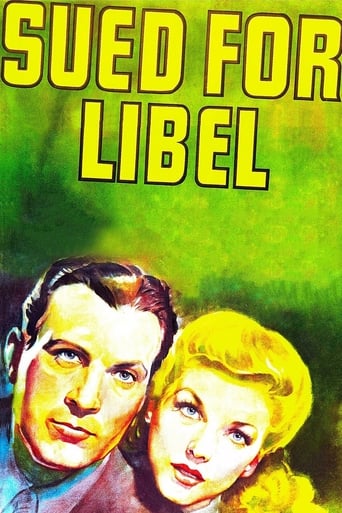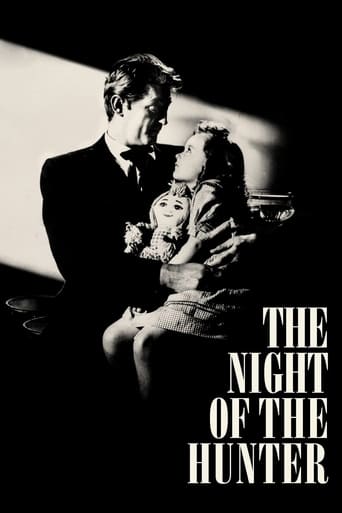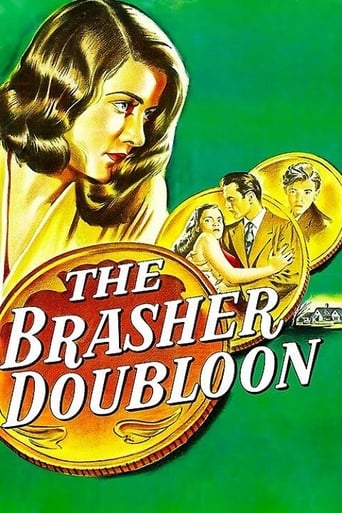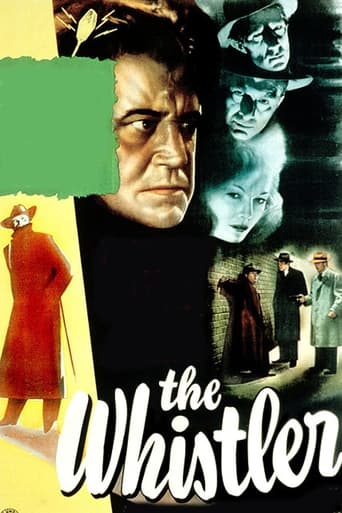
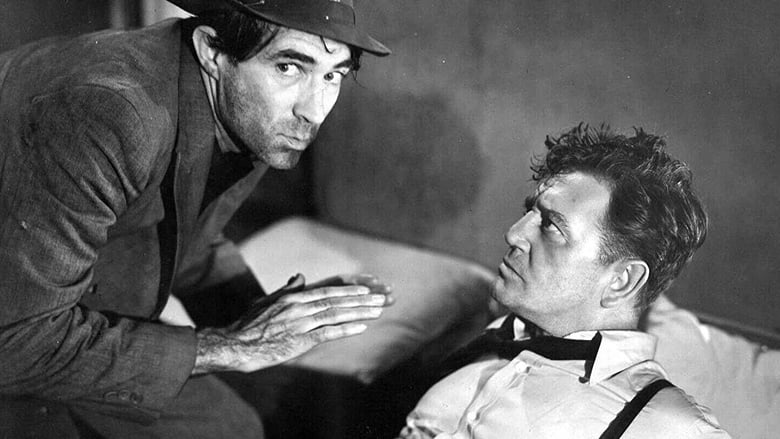
The Whistler (1944)
A guilt-ridden man blames himself for his wife's death and secretly pays an assassin to kill him. But then he finds out that his wife isn't dead at all. And now the assassin is on his trail, with no way to call off the hit.
Watch Trailer
Cast


Similar titles
Reviews
Best movie of this year hands down!
hyped garbage
One of the most extraordinary films you will see this year. Take that as you want.
Actress is magnificent and exudes a hypnotic screen presence in this affecting drama.
Solid, low-budget film noirish yarn about a man who takes out a contract on himself and then through a reversal of fortune decides against it. The Whisteler open up the film with that delightfully creepy little tune and a brief narrative and the reigns are handed over to a competent corp of character actors(and Richard Dix and Gloria Stuart). Dix plays the lead well-enough though incredibly lethargically. He literally looks like he hasn't slept in days. Stuart is peppy and pretty in a smallish role, but J. Carrol Naish does an outstanding job as the contracted killer. He gives a layered performance is what was a truly difficult role. The film barely spans an hour and ten minutes or so but never lags. we get suspense, action, and answers rather quickly. The Whistler has a much more subdued role then what you would hear in the radio series. This film would go on to spawn many sequels and was one of the earliest directorial forays of horror icon William Castle. Castle, as always, does a more than workmanlike job.
The first in a series of "Whistler" films to be based on the popular radio show, which evolved into a television series by 1954. This theatrical film actually looks and plays like a TV episode, with defunct writing and mostly generic casting, though it is entertaining for the brief time it stays on. Businessman, mourning the loss of his wife at sea (for which he harbors guilt and shame), orders a contract hit on himself before ultimately changing his mind; unfortunately, the deal-maker has been shot dead and the hit-man is determined on finishing the job (though we're not sure why...maybe he's anal-retentive?). Richard Dix is a most unusual actor for the lead: tough and robust, yet playing at sad-eyed, he's hardly vulnerable and looks as if he can take care of himself. We don't fear for the character's safety, but it does look as if he's about to lose his job at any moment. The Whistler sets the scene for us, popping up in the narrative only briefly--a ploy which is risky and fascinating for a thriller. ** from ****
(There are Spoilers) In an almost empty bar on the city docks businessman Earl C. Conrad, Richard Dix, has a prearranged meeting with this stranger who's to get a "job" done for him. The stranger a local hoodlum named Lefty Vigran, Don Costello, is to set up a hit on someone that Conrad want's iced by no later that Friday. What Lefty doesn't know, since everything between the two is done on a no name basis, is that the person that Conrad want's to be hit is non other then himself!Dark creepy and unnerving suspense drama that has a man wanting to commit suicide but not having the guts to do it himself. Hiring a hit-man to do him in Conrad's contact Lefty, who it turns out is a fugitive cop killer, ends up getting gunned down by the police resisting arrest moments after he leaves Conrad drinking away his troubles in the bar. Lefty having his runner the deft mute, who reads only Superman comic books, William Benedict get the message, with the $5,000.00 fee, to the hit man's, J. Carrol Naish, hotel room put everything into motion to get Earl C. Conrad the wish that he's been hoping for. A death wish Conrad had since he, in his confused and disturbed mind, left his wife Claire to drown in a boating accident in the Pacific Ocean.It's later that a shocked Conrad gets the "good news" from his secretary, who's secretly in love with him, Alice Walker( Gloria Stuart) that the Red Cross had found that his wife in fact survived and is interned in a Japanese internment camp ; the film takes place during WWII. Conrad now not waning to have his life snuffed is in a dilemma in not being able to contact Lefty, who's dead, and not knowing who the hit-man, J. Carrol Naish, is! This all leaves Conrad, if he wasn't already, to become a paranoid individual suspecting anyone he runs into to be the man who's out to take his life! The man that he in fact paid to do it!Excellent performance by former silent film and cowboy star Richard Dix as a man, Earl C. Conrad, who screwed himself by overreacting to a tragedy that he in fact had nothing to do with. In fact Conrad heroically saved a number of passengers from the sinking cruise ship that he and Claire were on but had her slip out of his hands at the last moment. The insane hit that Conrad arranged on himself was in fact far worse that any conceived notion of guilt that he had about his wife's death. Arranging a mob hit, even on oneself, is murder and knowingly wanting and paying to murder someone, even himself, is far worse then even letting, which Conrad didn't, someone purposely drown!The movie has a really good double surprise ending that, even though it's very contrived, ties all the loose ends together. The ending not only rights all the wrongs of what Conrad crazily did to himself, and those like Alice who loved him, but shows the audience that "The Whistler" was right all alone in his assertion that a curtain individual's destiny was to die tonight.
This movie is the first installment of The Whistler series from Columbia Pictures, all but one of which starred Richard Dix whose A-picture career was then on an alcoholic downgrade, but whose liquor-ravaged face was just right for the overall atmosphere. (For a complete list of series titles, consult "movie connections" on web page.) Of all the movie series to emerge from the 30's and 40's, this is easily one of the most fascinating and unusual. Each entry presents a different self-contained story, tied together only by the mysterious figure of The Whistler who comments briefly on plot developments, but appears only in shadow to whistle his trademark refrain. He seems to be a figure of fate since the hand of destiny emerges in most of the entries. But most importantly, the plots follow no formula (unusual for any series) and are entirely unpredictable in their outcome. This unpredictability is what distinguishes the series from others of the time.You really don't know what's going to happen or how each episode will turn out. Moreover, there's a strong noirish quality to many of the entries, with a suspenseful atmosphere, an underlying sense of doom, and imaginative characters and plot twists. All in all, the productions are a first cousin to the celebrated Val Lewton horror cycle from RKO, minus the supernatural. I'm surprised that with all the scholarly interest in film noir, that this noirish series has not received the critical attention it merits.Though weaker in many ways (the script appears put together on the fly), this initial entry contains many features generic to the others. Dix, a prosperous manufacturer, arranges for his own death following the presumed death of his beloved wife, only to find out ironically that she is not dead. The problem is he can't undo the arrangement and is thus forced to escape through the labyrinthine venues of the city's skid row. The entire 60 minutes has something of a nightmarish quality since it starts off with Dix expecting death, though in what form, he can't be sure. Looking convincingly like a real bum, it's Dix's tour through the seedy parts of the city that really commands attention, especially the 25-cent flop-house with its rows of coffin-like cots, snoring vagrants, and sneak thief. You can almost smell the rot-gut whiskey peeling off the walls. The sets are bare-bones, the cafes, bars, and city sidewalks sometimes suggesting the unadorned depths of urban despair. Unfortunately, the ending is abrupt and disappointing. It's almost as though the production suddenly ran out of film and had to wrap it up right then. Nonetheless, many of the distinctive elements of the productions are already present. Unfortunately copies of the series are hard to obtain ( my own burned in a house fire some time ago). So let's hope our friends on cable TV follow up on this initial entry some time soon. It's well worth tuning in.


